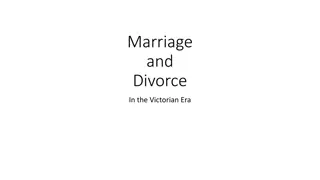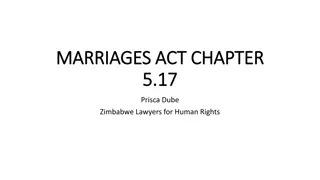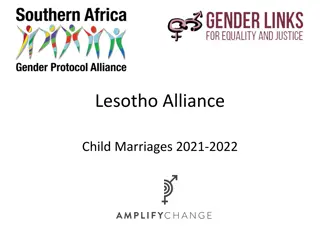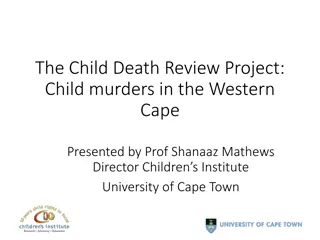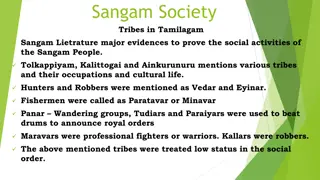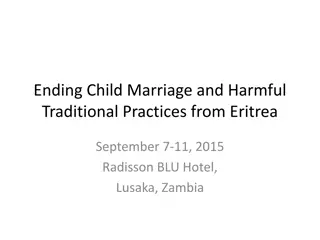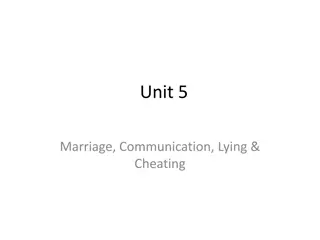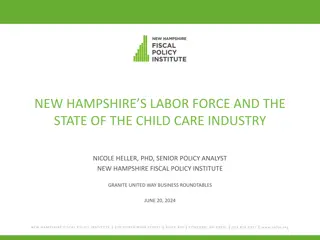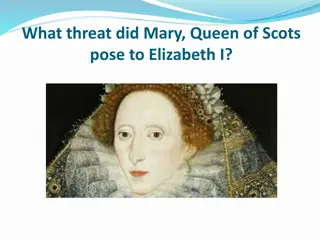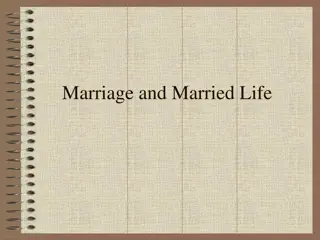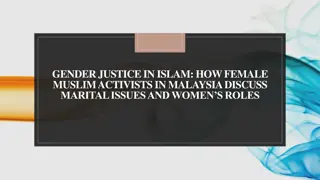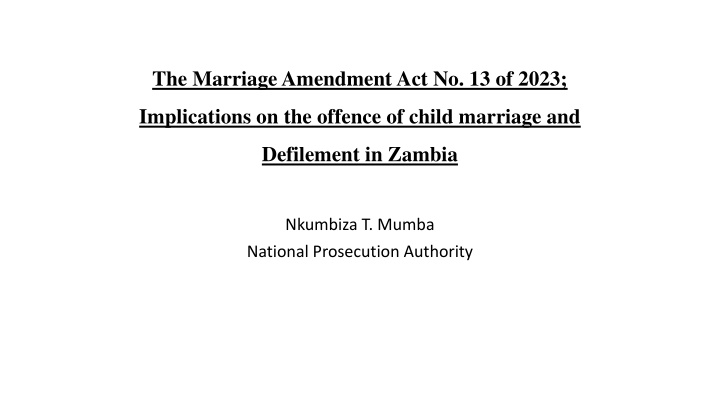
Implications of Marriage Amendment Act No. 13 of 2023 on Child Marriage and Defilement in Zambia
Explore the implications of the Marriage Amendment Act No. 13 of 2023 on child marriage and defilement in Zambia, highlighting legal frameworks, definitions, prevalence, and the progression of laws protecting children against early marriage. Learn how this act aims to safeguard fundamental human rights and address the challenges posed by early marriage practices in the country.
Download Presentation

Please find below an Image/Link to download the presentation.
The content on the website is provided AS IS for your information and personal use only. It may not be sold, licensed, or shared on other websites without obtaining consent from the author. If you encounter any issues during the download, it is possible that the publisher has removed the file from their server.
You are allowed to download the files provided on this website for personal or commercial use, subject to the condition that they are used lawfully. All files are the property of their respective owners.
The content on the website is provided AS IS for your information and personal use only. It may not be sold, licensed, or shared on other websites without obtaining consent from the author.
E N D
Presentation Transcript
The Marriage Amendment Act No. 13 of 2023; Implications on the offence of child marriage and Defilement in Zambia Nkumbiza T. Mumba National Prosecution Authority
Introduction Child marriage is not merely a breach of legal boundaries; it is a violation of fundamental human rights such as education, a menace that robs our children of their innocence and full potential. Child marriage undermines children s emotional, sexual and reproductive health. Research has shown that early marriage perpetuates poverty mostly because child brides do not receive education and economic opportunities that may lift them and their families from poverty.
Definition of Child Marriage The Children s Code Act, 2022 of the Laws of Zambia defines child marriage to mean marriage with a child or any arrangement made by a person for that marriage. According to the Ministry of Gender s National Strategy on Ending Child Marriage in Zambia: 2016 to 2021, Child marriage is defined as the legal marriage or informal union before the age of 18 years.
Prevalence of Child Marriage in Zambia Statistics from UNFPA and UNICEF, show that in Zambia 29 per cent of all young women aged 20 24 are married before 18 years, and 5 per cent before turning 15. Note that although the presentation will mostly refer to girls and women, boys are also affected though not as much as girls. For example according to the 2013-14 Zambia Democratic Health Survey, among 15 -19 year old girls 16.5%of girls were married compared to 1%of boys and among 20-24 year- olds 31% of females were married compared with only 2.2% of males
Legal Framework relating to Child Marriage in Zambia (i)The Constitution, Chapter 1 of the Laws of Zambia; (ii) The marriage Act, Chapter 50 of the Laws of Zambia; (iii)The Children s Code Act No. 12 of 2022; (iv)The Education Act, No. 23 of 2011; and (v)The Penal Code Chapter 87 of the Laws of Zambia.
Progression of the Law protecting children against Child Marriage Before August 2022, the offence of child marriage was limited to child learners under the Education Act, No. 23 of 2011 of the Laws of Zambia. Section 18 of the Education Act, No. 23 of 2011 prohibits the marrying off of learners as follows: (1) Subject to the Constitution and any other written law, a learner who is a child shall not contract any form of marriage. (2) A person shall not (a) marry or marry off a learner who is a child; or (b) prevent or stop a learner who is a child from attending school for the purpose of marrying or marrying off the learner who is a child. (3) A person who contravenes this section commits an offence and is liable, upon conviction, to imprisonment for a period of not less than fifteen years and may be liable to imprisonment for life.
Progression continued. In August 2022, Children s Code Act, No. 12 of 2022 was passed into law. The Children s Code Act criminalised child marriage and provided a penal sanction of imprisonment of up to 10 years in section 18 and 293 respectively. Notwithstanding these progressive strides, there remained the challenge of marriages under customary law as the Marriage Act did not expressly state its application to customary law. While the Marriage Act provided for marriage age as 21 and for parental consent for those aged less than 21, customary law marriages are largely dependent not on age but on when a child reaches puberty and develops the capacity to care for oneself and others. Due to this dual legal system which recognised marriages contracted under statutory and customary law, there was a lacuna which left children susceptible to child marriage in the customary law realm.
Progression continued The Act came into law on 22ndDecember, 2023 after the President assented to the Bill. The passing into law of this amendment came as a result of wide consultation and stakeholder engagement so as to bring the Marriage Act in line with international, regional and national commitments Zambia has made. These commitments are in line with the country s commitment to eliminate child, early and forced marriages by 2030 in line with target 5.3 of the Sustainable Development Goals.
Salient provisions of the Marriage Amendment Act The Act amends inter alia sections 2, 33 and 34 of the Marriage Act Chapter 50 of the Laws of Zambia. Section 2 was amended to bring the definition of Child in line with the Republican Constitution which places the age of child as a person who has attained or is below the age of 18. Section 33 was amended by repealing the whole section and replacing it with the current provision which provides that: A marriage between persons either of whom is a child is void . Section 34 was also repealed and replaced. Notably section 34(2) which provides that: , section 33 shall apply to a marriage contracted under or in accordance with any African Customary law . Section 34(c) therefore clarifies on the law and provides a departure from the law as it stood before Amendment Act No. 13 of 2023.
Implications of the Marriage Amendment Act no 13 of . 2023 The Amendment Act categorically prohibits child marriages, whether conducted under customary or statutory law. The law now renders any marriage involving a child void. The law now incorporates all children not covered by the Education Act.
Implications of the Marriage Amendment Act no 13 of 2023 continued The defence to defilement in the case of Rex V Chinjamba (1949) that a man could not defile his wife notwithstanding the fact that she was below the age of sexual consent then which is 16 years is no longer available. Amendment now criminalises defilement committed under the guise of customary marriage. Having criminalized child marriage, it means that by implication all those that facilitate child marriages are amenable to prosecution. Prosecutions can be conducted under the Education Act if the Child is a learner or the Children s Code Act if the child is not a learner. This now provides the NPA with the impetus to prosecute child marriage cases.
Implications of the Marriage Amendment Act no 13 of 2023 continued Though commendable strides have been made with enacting laws, concerted efforts have to be put in place by us prosecutors, the government and co-operating partners to enhance institutional frameworks by capacitating key actors in the child protection sector. Successful implementation of this legal reform is contingent on effective enforcement, collaboration, and coordination across sectors as well as the need to educate and sensitise stakeholders and communities about the new law and its consequences. National interagency approaches and coordinated community response mechanism must be developed and robustly implemented.
Conclusion The marriage Amendment Act No. 13 0f 2023 has clarified on the law on a legal system that treated children differently by allowing some to be victims of defilement under the guise of customary law marriages. We now have the law on which we can base our reasons to prosecute and bring people who take advantage of children by marrying them and marrying them off. As we do so let us keep in mind our shared responsibility to protect the rights and well-being of our young girls and boys.





